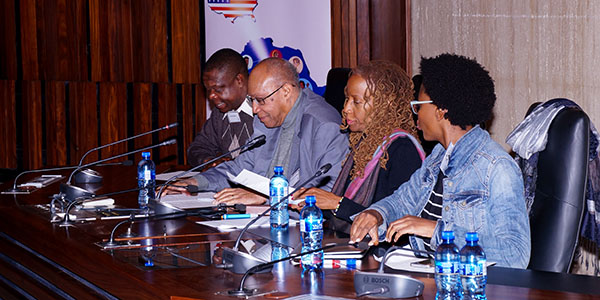Reviewing Obama's Mandela Lecture
- Gillian Anstey
What were the key themes and the significance of Obama's Nelson Mandela lecture?
The African Centre for the Study of the United States’ (ACSUS) review forum at Wits on July 27 to discuss Obama’s Mandela Lecture at Wanderer’s Stadium in Johannesburg on June 17, and the Madiba Legacy, was provocative from its opening remarks.
First Professor Gilbert Khadiagala, director of what is colloquially referred to as the African Centre, announced he had initially been sceptical about holding a second event, the first having been a discussion on July 10 about the two former president’s legacies.
Then Professor Tawana Kupe, Acting Vice-Chancellor of Wits, said he had attended the lecture but “was a bit annoyed, I will be frank,’’ he said before elaborating on the decision to have four people – incidentally all his friends – spoke before Obama.
Kupe said he understood the Nelson Mandela 16th annual lecture was “Obama’s coming-out speech, post-presidency, in the continent that is linked to his descent’’ but despite its 'inspirational’ delivery, he didn’t think Obama said anything new, and omitted to speak of terrorism and his role in dealing with it.

The review was divided into three sections: an analysis of Obama’s speech; foreign policy and diplomacy perspectives; and media representation.
Some snippets of the eight presentations:
- “As the only institution of its kind on the continent, the centre should invite Barack Obama to open his own ‘pan-African thought and conversation’ with it which, I believe, would be to the inestimable benefit of both Obama and the centre and to the wider benefit of our commemorating the UN International Decade of Peoples of African Descent’’ - Francis Kornegay, Senior Fellow at the Institute for Global Dialogue at Unisa;
- “Legacies are not set in stone. This applies to Obama and to Madiba as well. How do we access how these two 'firsts' promoted and/or diminished democratic values, human rights and civil liberties? These matters are being debated as we speak. Their stories are still being shaped and formed. It is not yet over, not for either of them’’ - Alice Brown, Visiting Research Fellow at ACSUS;
- “I enjoyed the speech mainly because I got to meet him beforehand. He is tall and gorgeous and he has a firm handshake and he asked me my name – what’s your name, sister?’’ and I swooned …. My first contention about [an Atlantic article about the speech’s] framing of liberal internationalism as this grand progressive force for the majority of people in the world is just not true. What we know about the foundations of liberal thought is that they are fundamentally racist and sexist’’ – Dr Sithembile Mbete, political science lecturer at the University of Pretoria;
- “Although both Mandela and Obama have this great charisma and superstar status around them, they’re at base both very pragmatic leaders and they try to have a world view … based on facts.... As Obama said in his lecture: ‘you have to believe in facts’. And so we saw this on display. In fact Obama used the formulation ’history tells us’ or ’history shows’ at seven different points during the speech’’ - Chris Williams, Visiting Research Fellow in International Relations Department at Wits;
- “[Mandela] arrived a little too late on AIDS, the health pandemic that became a security issue… It took his oldest son’s illness and death to spur him into activism in 2004 … on an issue that had such a devastating human impact in South Africa (800 people dying every day at the height of the crisis)’’ - Michelle Small, Wits International Relations lecturer;
- “I think most people read the Obama speech not in the grand lesson of history he was intending to promulgate but as a very specific, strong - although entirely complicit since the dreaded name Donald Trump was never used - critique of Donald Trump as president’’ - Brooks Spector, Associate Editor at the Daily Maverick;
- “Look at the Kenyan headlines….There was no connection, there was no discussive context, about what he was coming to do here and his visit to Kenya… because he went to see his grandma that became a focus … you miss the story of a major important occasion for the world and you highlight trivia. … the attention that was paid to the dance he had with his grandma’’ - Nixon Kariithi, CEO of Tangaza Africa Media;
- “One of my students said of all the things that Obama said what he liked most was the American accent, he called it a twang, and he said if he could acquire that that would be sufficient for him. That’s also soft power because you are being attracted to the US because of language’’ – Dr Bob Wekesa, Wits Journalism and Media Studies Department:
The presentations from both the centre’s July events will be published which, Kupe said, would fulfil one of its aims: ‘’to produce original knowledge of perspectives of us and the United States and, by extension, the world’’.

